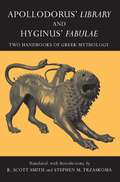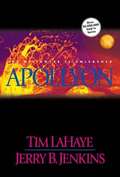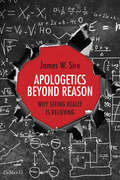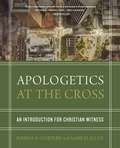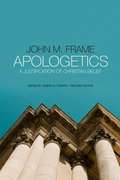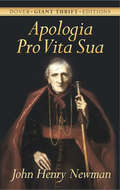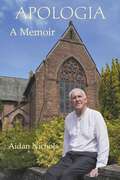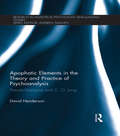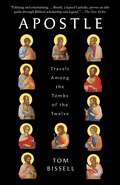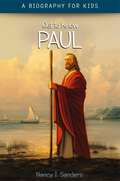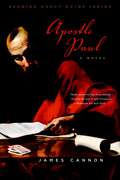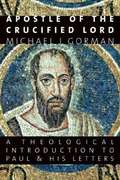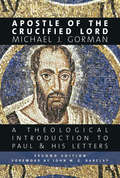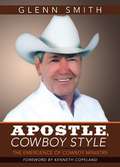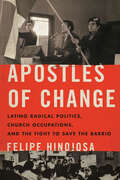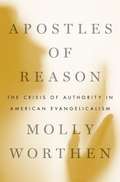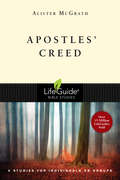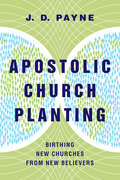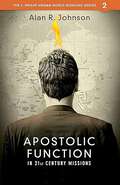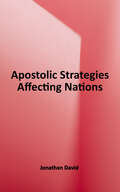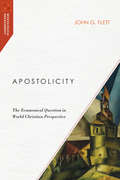- Table View
- List View
Apollodorus' Library and Hyginus' Fabulae: Two Handbooks of Greek Mythology
by R. Scott Smith Stephen M. TrzaskomaBy offering, for the first time in a single edition, complete English translations of Apollodorus' Library and Hyginus' Fabulae--the two most important surviving "handbooks" of classical mythography--this volume enables readers to compare the two's versions of the most important Greek and Roman myths. A General Introduction sets the Library and Fabulae into the wider context of ancient mythography; introductions to each text discuss in greater detail issues of authorship, aim, and influence. A general index, an index of people and geographic locations, and an index of authors and works cited by the mythographers are also included.
Apollyon: The Destroyer Is Unleashed (Left Behind Series #Book 5)
by Tim Lahaye Jerry B. JenkinsThe #1 best-selling hardcover novel of 1999 is now available in softcover! The Tribulation Force travels to Israel for the Meeting of Witnesses as further judgments are released upon the world. Satan falls from heaven and opens the bottomless pit, releasing Apollyon and his plague of locusts that torture the unsaved. Now available in trade softcover, Apollyonis a thriller that will be tough to put down.
Apollyon: The Destroyer Is Unleashed (Left Behind, # #5)
by Tim Lahaye Jerry B. JenkinsThe world holds its breath as the Tribulation Force ventures to Jerusalem for the great Meeting of the Witnesses, where tens of thousands defy the Antichrist to sit under the ministry of their pastor-teacher, Tsion Ben-Judah. Meanwhile, Rayford Steele finally discovers the shocking truth about his wife, Amanda, but becomes an international fugitive. The fifth Trumpet Judgment-a plague of scorpion-like locusts led by Apollyon, chief demon of the abyss -is so horrifying that men try to kill themselves but are not allowed to die. This book has reached the New York Times best-seller list and is the most shocking and explicit portrayal yet in the continuing drama of those left behind.
Apologetics Beyond Reason: Why Seeing Really Is Believing
by James W. Sire"Look carefully. Listen closely. Do you see? Do you hear? There are a million signposts pointing toward the specific truth of God in Christ. I've seen many of them. But God is speaking to you too. Look and see. Listen and hear." In this accessible and engaging work, veteran apologist Jim Sire gives us eyes to see the myriad "signals of transcendence" all around us that point to the specific truth of God in Christ. Focusing on the power of good literature—even from those who deny the existence of God—enables us to perceive and testify to God's reality in ways that rational argument alone cannot. "While reason can be very helpful in pointing us to God and helping us in our apologetics, what compels and convinces people is more multidimensional," says Sire. "What is needed is a more holistic apologetic that not only includes truth but also goodness and beauty." All inspiration is rooted in God the Creator, and some of God's truth lies buried until an artist exposes it. Good literature, written from a Christian standpoint or not, displays multiple examples of our human understandings of God, the universe and ourselves. It testifies to the existence of a transcendent realm and often, in fact, to the truth of the Christian faith.
Apologetics at the Cross: An Introduction for Christian Witness
by Joshua D. Chatraw Mark D. AllenAmid the pluralism and secularism of Western culture, Christian apologetics has experienced a renewal of interest. In Apologetics at the Cross, Joshua D. Chatraw and Mark D. Allen provide an introduction to the field, acquainting students and lay learners with the rich history, biblical foundation, and ongoing relevance of apologetics.Unique in its approach, Apologetics at the Cross presents the biblical and historical foundations for apologetics, explores various contemporary methods for approaching apologetics, and gives practical guidance in "how to" chapters that feature many real-life illustrations. With their respectful approach, which pays special attention to the attitude and posture of the apologist, Chatraw and Allen equip Christians to engage skeptics with the heart as well as the mind.Conversational in tone and balanced in approach, Apologetics at the Cross provides a readable introduction to the field of apologetics. Readers will be informed and equipped for engaging a wide range of contemporary challenges with the best in Christian thought.
Apologetics: A Justification Of Christian Belief
by John M. Frame Joseph E. TorresRenowned theologian John Frame sheds much-needed light on the message and method of genuinely Christian apologetics in this landmark title. He insightfully examines apologetics in terms of proof, defense, and offense and clarifies the relationships of reason, proofs, and evidences to faith, biblical authority, and the lordship of Christ. <p><p> Two subjects of particular note are Frame's fresh look at probability arguments and a stimulating investigation into the problem of evil. <p> Some of the most valuable elements of this book are Frame's extensive use of Scripture and his presentation of specific lines of argument. There is also a model dialogue in the concluding chapter that shows how these lines of argument work in conversation.
Apologia Pro Vita Sua
by John Henry NewmanA highly influential figure in the Church of England, John Henry Newman stunned the Anglican community in 1843, when he left his position as vicar of St. Mary's, Oxford, to join the Roman Catholic church. Perhaps no one took greater offense than Protestant clergyman Charles Kingsley, whose scathing attacks against Newman's faith and honor inspired this brilliant response. Apologia Pro Vita Sua, Newman's spiritual autobiography, explores the depths and nature of Christianity with flowing prose and a conversational style that has ensured its status as a classic."False ideas may be refuted by argument, but by true ideas alone are they expelled. I will vanquish," Newman promised, "not my accuser, but my judges." His honest and passionate defense consists of a personal history of his religious convictions, from earliest memory through the Oxford movement and his ultimate conversion. His concluding point-by-point refutation of Kingsley's charges features thought-provoking contentions that strike at the very roots of the principles underlying Protestantism. Newman won respect and admiration with his Apologia, a work that has helped clarify perceptions of Roman Catholicism among readers of every faith.
Apologia: A Memoir
by Aidan NicholsAidan Nichols has been contributing to theological literature since the beginning of the 1980s. Now in his seventy-fifth year, he looks back not only at his writings but at the three-quarters of a century of life from which they came. He explains how, despite a nominally Anglican background, his early sense of the transcendent was really of God in nature. Only through an experience in the Russian church in Geneva did he become a confessing Christian. Back home, where he was left a teenage orphan, he moved from Anglo-Catholicism into the Roman Catholic Church. After reading Modern History at Oxford, that led by a natural progression to becoming a Religious and a priest. In this book Nichols describes the wide variety of situations in which he has lived in Scotland, Norway, Rome, France, Ethiopia, and Jamaica, as well as England and the United States. Over the years, drawing on not only Catholic but also Orthodox and Anglican sources, he has produced a small library of books, touching on many areas of theology and culture while also seeking, at different times, to bind them together into a coherent unity, inspired by, principally, two great giants: Thomas Aquinas, and Hans Urs von Balthasar.
Apophatic Elements in the Theory and Practice of Psychoanalysis: Pseudo-Dionysius and C.G. Jung (Research In Analytical Psychology And Jungian Studies)
by David HendersonHow can the psychotherapist think about not knowing? Is psychoanalysis a contemplative practice? This book explores the possibility that there are resources in philosophy and theology which can help psychoanalysts and psychotherapists think more clearly about the unknown and the unknowable. The book applies the lens of apophasis to psychoanalysis,
Apostle
by Tom BissellA profound and moving journey into the heart of Christianity that explores the mysterious and often paradoxical lives and legacies of the Twelve Apostles--a book both for those of the faith and for others who seek to understand Christianity from the outside in. Peter, Matthew, Thomas, John: Who were these men? What was their relationship to Jesus? Tom Bissell provides rich and surprising answers to these ancient, elusive questions. He examines not just who these men were (and weren't), but also how their identities have taken shape over the course of two millennia. Ultimately, Bissell finds that the story of the apostles is the story of early Christianity: its competing versions of Jesus's ministry, its countless schisms, and its ultimate evolution from an obscure Jewish sect to the global faith we know today in all its forms and permutations. In his quest to understand the underpinnings of the world's largest religion, Bissell embarks on a years-long pilgrimage to the supposed tombs of the Twelve Apostles. He travels from Jerusalem and Rome to Turkey, Greece, Spain, France, India, and Kyrgyzstan, vividly capturing the rich diversity of Christianity's worldwide reach. Along the way, he engages with a host of characters--priests, paupers, a Vatican archaeologist, a Palestinian taxi driver, a Russian monk--posing sharp questions that range from the religious to the philosophical to the political. Written with warmth, empathy, and rare acumen, Apostle is a brilliant synthesis of travel writing, biblical history, and a deep, lifelong relationship with Christianity. The result is an unusual, erudite, and at times hilarious book--a religious, intellectual, and personal adventure fit for believers, scholars, and wanderers alike.From the Hardcover edition.
Apostle Paul (Get to Know)
by Nancy I. SandersApostle Paul—part of the Get to Know series—is a unique biography about Paul. Focusing on the life and character of this Biblical hero, using color photographs, maps, and other visual resources to tell the whole story, young biography fans will come to learn more about this man of the God, his writings, his impact on the early church, and the role he plays in history.Featuring a bibliography and scriptural references throughout, this is sure to become a favorite for young readers and for first book reports.
Apostle Paul: A Novel
by James CannonThe iconic Saint Paul - in his lifetime a scholar, prosecutor for the high court of the Jews, accomplice in murder, adventurer, traveler, orator, writer, advocate, and organizer of a new faith - was in fact a Jewish-Hellenistic citizen of the Roman Empire, a man who by the force of his intellect and indomitable will changed the course of history. Eventually he became the leader of the movement that delivered the social and moral authority of Christianity to a pagan world. Given a message - that man and woman had a purpose in earthly life and a future beyond the grave - he carried it first and unsuccessfully to his fellow Jews, then successfully to the gentiles and all mankind. His quality of mind and ability to exhort and persuade, his personal commitment to ethical conduct and values, and his courage and indefatigability made Paul one of the continuing forces in the progress of Western civilization.Author James Cannon has written about political leaders as a journalist, has served with leaders in public life, and has written feature stories while on the staffs of Time and Newsweek. Now he has taken the story of one of the most momentous quests in history and brought it to life with a vitality and immediacy that is at once gripping, informative, and inspiring.
Apostle of the Crucified Lord: A Theological Introduction to Paul and His Letters
by Michael J. GormanUnlike the many books that treat the apostle Paul merely as a historical figure and his letters as literary relics, this new study by Michael Gorman focuses on the theological message of Paul's writings, particularly what they have to say to the contemporary church. An innovative and comprehensive treatment of Paul, including commentary on all of the Pauline letters, Gorman's Apostle of the Crucified Lord unpacks the many dimensions of Paul's thought carefully and holistically. Six introductory chapters provide background discussion on Paul's world, his resume, his letters, his gospel, his spirituality, and his theology, while the main body of the book covers in turn and in full detail each of the Pauline epistles. Gorman gives the context of each letter, offers a careful reading of the text, and colors his words with insightful quotations from earlier interpreters of Paul. Enhancing the text itself are questions for reflection and discussion at the end of each chapter and numerous photos, maps, and tables throughout. All in all, Apostle of the Crucified Lord is the ideal book for students and any other readers interested in seriously engaging Paul's challenging letters. "
Apostle of the Crucified Lord: A Theological Introduction to Paul and His Letters
by Michael J. GormanTHIS COMPREHENSIVE, WIDELY USED TEXT by Michael Gorman presents a theologically focused, historically grounded interpretation of the apostle Paul and raises significant questions for engaging Paul today. After providing substantial background information on Paul's world, career, letters, gospel, spirituality, and theology, Gorman covers in full detail each of the thirteen Pauline epistles. Enhancing the text are questions for reflection and discussion at the end of each chapter as well as numerous photos, maps, and tables throughout. The new introduction in this second edition helpfully situates the book within current approaches to Paul. Gorman also brings the conversation up-to-date with major recent developments in Pauline studies and devotes greater attention to themes of participation, transformation, resurrection, justice, and peace.
Apostle of the Crucified Lord: A Theological Introduction to Paul and His Letters
by Michael J. GormanTHIS COMPREHENSIVE, WIDELY USED TEXT by Michael Gorman presents a theologically focused, historically grounded interpretation of the apostle Paul and raises significant questions for engaging Paul today. After providing substantial background information on Paul's world, career, letters, gospel, spirituality, and theology, Gorman covers in full detail each of the thirteen Pauline epistles. Enhancing the text are questions for reflection and discussion at the end of each chapter as well as numerous photos, maps, and tables throughout. The new introduction in this second edition helpfully situates the book within current approaches to Paul. Gorman also brings the conversation up-to-date with major recent developments in Pauline studies and devotes greater attention to themes of participation, transformation, resurrection, justice, and peace.
Apostle, Cowboy Style
by Glenn SmithGlenn Smith, founder and president of International Western World Outreach Center, Inc. (a.k.a. Rodeo Cowboy Ministries), was an exrodeo professional and rancher. <P><P>Ministering the gospel with a western flavor, Glenn was ordained to full-time ministry in the early nineteen seventies. Preaching and teaching the uncompromised Word of God, Glenn and his wife, Ann, have traveled throughout the U.S. and many other countries.
Apostle: Travels Among the Tombs of the Twelve
by Tom BissellA profound and moving journey into the heart of Christianity that explores the mysterious and often paradoxical lives and legacies of the Twelve Apostles—a book both for those of the faith and for others who seek to understand Christianity from the outside in.“Expertly researched and fascinating… Bissell is a wonderfully sure guide to these mysterious men.… This is a serious book about the origins of Christianity that is also very funny. How often can you say that?” —The Independent Peter, Matthew, Thomas, John: Who were these men? What was their relationship to Jesus? Tom Bissell provides rich and surprising answers to these ancient, elusive questions. He examines not just who these men were (and weren’t), but also how their identities have taken shape over the course of two millennia. Ultimately, Bissell finds that the story of the apostles is the story of early Christianity: its competing versions of Jesus’s ministry, its countless schisms, and its ultimate evolution from an obscure Jewish sect to the global faith we know today in all its forms and permutations. In his quest to understand the underpinnings of the world’s largest religion, Bissell embarks on a years-long pilgrimage to the supposed tombs of the Twelve Apostles. He travels from Jerusalem and Rome to Turkey, Greece, Spain, France, India, and Kyrgyzstan, vividly capturing the rich diversity of Christianity’s worldwide reach. Along the way, he engages with a host of characters—priests, paupers, a Vatican archaeologist, a Palestinian taxi driver, a Russian monk—posing sharp questions that range from the religious to the philosophical to the political. Written with warmth, empathy, and rare acumen, Apostle is a brilliant synthesis of travel writing, biblical history, and a deep, lifelong relationship with Christianity. The result is an unusual, erudite, and at times hilarious book—a religious, intellectual, and personal adventure fit for believers, scholars, and wanderers alike.From the Hardcover edition.
Apostles of Change: Latino Radical Politics, Church Occupations, and the Fight to Save the Barrio
by Felipe HinojosaThis “important and well-researched” study of 1960s urban Latino activism and religion is “brimming with the ideas and voices of . . . Latinx activists” (Llana Barber, author of Latino City).In the late 1960s, American cities found themselves in steep decline, with poor and working-class families hit the hardest. Many urban religious institutions debated whether to move to the suburbs. Against the backdrop of the Black and Brown Power movements, which challenged economic inequality and white supremacy, young Latino radicals began occupying churches and disrupting services to compel church communities to join their protests against urban renewal, poverty, police brutality, and racism.Apostles of Change tells the story of these occupations and establishes their context within the urban crisis. It underscores the tensions they created and the activists’ bold, new vision for the church and the world. Through case studies from Chicago, Los Angeles, New York City, and Houston, Felipe Hinojosa reveals how Latino freedom movements crossed the boundaries of faith and politics. He argues that understanding these radical politics is essential to understanding the dynamic changes in Latino religious groups from the late 1960s to the early 1980s.
Apostles of Change: Latino Radical Politics, Church Occupations, and the Fight to Save the Barrio
by Felipe HinojosaThis “important and well-researched” study of 1960s urban Latino activism and religion is “brimming with the ideas and voices of . . . Latinx activists” (Llana Barber, author of Latino City).In the late 1960s, American cities found themselves in steep decline, with poor and working-class families hit the hardest. Many urban religious institutions debated whether to move to the suburbs. Against the backdrop of the Black and Brown Power movements, which challenged economic inequality and white supremacy, young Latino radicals began occupying churches and disrupting services to compel church communities to join their protests against urban renewal, poverty, police brutality, and racism.Apostles of Change tells the story of these occupations and establishes their context within the urban crisis. It underscores the tensions they created and the activists’ bold, new vision for the church and the world. Through case studies from Chicago, Los Angeles, New York City, and Houston, Felipe Hinojosa reveals how Latino freedom movements crossed the boundaries of faith and politics. He argues that understanding these radical politics is essential to understanding the dynamic changes in Latino religious groups from the late 1960s to the early 1980s.
Apostles of Reason: The Crisis of Authority in American Evangelicalism
by Molly WorthenEvangelical Christianity is a paradox. Evangelicals are radically individualist, but devoted to community and family. They believe in the transformative power of a personal relationship with God, but are wary of religious enthusiasm. They are deeply skeptical of secular reason, but eager to find scientific proof that the Bible is true. <P> In this groundbreaking history of modern American evangelicalism, Molly Worthen argues that these contradictions are the products of a crisis of authority that lies at the heart of the faith. Evangelicals have never had a single authority to guide them through these dilemmas or settle the troublesome question of what the Bible actually means. Worthen chronicles the ideological warfare, institutional conflict, and clashes between modern gurus and maverick disciples that lurk behind the more familiar narrative of the rise of the Christian Right. The result is an ambitious intellectual history that weaves together stories from all corners of the evangelical world to explain the ideas and personalities-the scholarly ambitions and anti-intellectual impulses-that have made evangelicalism a cultural and political force.<P> In Apostles of Reason, Worthen recasts American evangelicalism as a movement defined not by shared doctrines or politics, but by the problem of reconciling head knowledge and heart religion in an increasingly secular America. She shows that understanding the rise of the Christian Right in purely political terms, as most scholars have done, misses the heart of the story. The culture wars of the late twentieth century emerged not only from the struggle between religious conservatives and secular liberals, but also from the civil war within evangelicalism itself-a battle over how to uphold the commands of both faith and reason, and how ultimately to lead the nation back onto the path of righteousness.
Apostles' Creed (LifeGuide Bible Studies)
by Alister McGrath"I believe in God the Father, Almighty, Maker of heaven and earth." This six-session LifeGuide Bible Study, based on Alister McGrath's book I Believe, introduces us to the Apostles' Creed and the essential truths about God the Father, the person and work of Jesus Christ, and the Holy Spirit. Christians indeed trust in God, and the basics of our faith have remained the same for centuries. These truths are summarized in historic church documents known as creeds. The Apostles' Creed is an ideal starting point for this vital process of consolidating our grasp of the faith. For over three decades LifeGuide Bible Studies have a provided solid biblical content and raised thought-provoking questions—making for a one-of-a-kind Bible study experience for individuals and groups. This series has more than 130 titles on Old and New Testament books, character studies, and topical studies.
Apostolic Church Planting: Birthing New Churches from New Believers
by J. D. PayneChurch planting is not just about gathering new communities of people who are already Christians. In the book of Acts, church plants begin with sharing the gospel. Planting churches flows naturally out of making disciples. Pastor J. D. Payne explains the process and stages of church planting, with biblical foundations and practical steps for planting teams. He provides a pathway for the multiplication of disciples, leaders and churches. Here are church planting strategies and activities that are simple, highly reproducible and can be implemented by ordinary team members, not just by charismatic leaders. This guide can be used for planting in contexts among any given people group, domestically or internationally. It is an ideal resource for teams to work through together as they follow God's call in their community.
Apostolic Function in 21st Century Missions (Assemblies of God Theological Seminary, J. Philip Hogan World Missions Series #2)
by Alan R. JohnsonIn the past we have focused on the “why” of missions in terms of motives, the “what” of missions in terms of the content of the message, and the “how” of missions in terms of methodologies and strategies, but the “where” question, in terms of where we send cross-cultural workers, has simply been assumed; it has meant crossing a geographic boundary. In Apostolic Function in 21st Century Missions, Alan R. Johnson introduces the idea of apostolic function as the paradigm of missionary self-identity that reminds us to focus our efforts on where Christ is not named. He then examines in detail the “where” paradigm in missions, frontier mission missiology, with a sympathetic critique and a review of the major contributions of unreached people group thinking. Johnson concludes by illustrating his notion of seeking to integrate missions paradigms and discussing of issues that relate specifically to the “where” questions of missions today.
Apostolic Strategies Affecting Nations
by Jonathan DavidApostolic Strategies Affecting Nations presents proven strategies to raise up strong governing churches. These strategies provide the blueprints to raise up breakthrough believers. Senior Pastors, ministry gifts and whole churches according to the New Testament patterns. Someday all churches will be built in this manner to impact their cities and influence their nations! "Every minister should study this book. It is truly a cutting edge present truth presentation and revelation from the heart and mind of God..." Dr. Bill Hamon, Christian International Ministries Network, USA .
Apostolicity: The Ecumenical Question in World Christian Perspective (Missiological Engagements)
by John G. FlettWhat constitutes the unity of the church over time and across cultures? Can our account of the church's apostolic faith embrace the cultural diversity of world Christianity? The ecumenical movement that began in the twentieth century posed the problem of the church's apostolicity in profound new ways. In the attempt to find unity in the midst of the Protestant-Catholic schism, participants in this movement defined the church as a distinct culture—complete with its own structures, rituals, architecture and music. Apostolicity became a matter of cultivating the church's own (Western) culture. At the same time it became disconnected from mission, and more importantly, from the diverse reality of world Christianity. In this pioneering study, John Flett assesses the state of the conversation about the apostolic nature of the church. He contends that the pursuit of ecumenical unity has come at the expense of dealing responsibly with crosscultural difference. By looking out to the church beyond the West and back to the New Testament, Flett presents a bold account of an apostolicity that embraces plurality.
